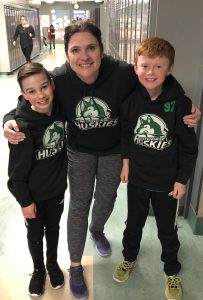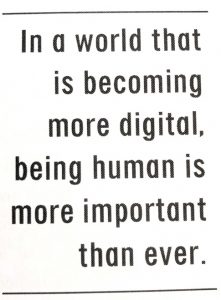– George Couros ‘Innovate Inside the Box’
Linking with Alanna Carmichael’s post from Task 12
Like Alanna, I used the Speculative Futures task to envision a future without in-person schools. In my comments to her, I mention that I agree with her skepticism about AI  replacing ‘soft skills’, such as emotion, relationship and genuine personality. I agree with Shannon Vallor that this won’t happen anytime soon and feel that the unpredictability of human behaviour and emotions are simply too much to program, especially in a way that is authentic, empathetic and responsive. I think of some of the incredibly joyous moments I have had as a teacher where I have celebrated student success, laughed uncontrollably with my students, had conversations that network and ‘hyperlink’ through a series of paths via experience that, I think, AI would struggle to do. I can also think of some incredibly horrific moments I have had as a teacher, such as conversations of disclosure, abuse, trauma and neglect. It is the most painful part of my job to hear children that I care deeply about divulge these experiences. How would AI handle these sensitive situations? I am not able to envision AI as a supportive listener and being able to connect on an emotional level to these situations, let alone help a student receive the necessary supports that require navigating some deep aspects of human nature. Yes, teachers are there to deliver content and help children learn, regardless of method or framework. Whether you are a teacher that takes the ‘Sage on the Stage’ or the ‘Guide on the Side’ approach, it is my opinion that students’ well-being is a priority. My pedagogy includes relationship, empathy and genuine nurturing support. I just don’t feel that this is something that can be replaced by AI anytime soon.
replacing ‘soft skills’, such as emotion, relationship and genuine personality. I agree with Shannon Vallor that this won’t happen anytime soon and feel that the unpredictability of human behaviour and emotions are simply too much to program, especially in a way that is authentic, empathetic and responsive. I think of some of the incredibly joyous moments I have had as a teacher where I have celebrated student success, laughed uncontrollably with my students, had conversations that network and ‘hyperlink’ through a series of paths via experience that, I think, AI would struggle to do. I can also think of some incredibly horrific moments I have had as a teacher, such as conversations of disclosure, abuse, trauma and neglect. It is the most painful part of my job to hear children that I care deeply about divulge these experiences. How would AI handle these sensitive situations? I am not able to envision AI as a supportive listener and being able to connect on an emotional level to these situations, let alone help a student receive the necessary supports that require navigating some deep aspects of human nature. Yes, teachers are there to deliver content and help children learn, regardless of method or framework. Whether you are a teacher that takes the ‘Sage on the Stage’ or the ‘Guide on the Side’ approach, it is my opinion that students’ well-being is a priority. My pedagogy includes relationship, empathy and genuine nurturing support. I just don’t feel that this is something that can be replaced by AI anytime soon.
Living in a small town and being a specialist (PE and library) teacher, I get to know many students. My pedagogy highlights relationships and I work hard to develop and maintain an environment where kids feel a sense of belonging and that I ‘have their back’ and best interest at heart; that they are cared for as a person, not just as a student filling a desk. Last year I was on education leave so I only experienced COVID education from the perspective of a parent. This has left me wondering what it will look like when I return to work in two weeks. How will my relationship-focussed pedagogy be the same or different?
I was on the plane yesterday returning home to Whitehorse from two fantastic weeks in Vancouver and the Okanagan. I was in my seat when a student of mine can sauntering up the aisle toward the bathroom. He saw me, yelled my name, I yelled his, then we kind of paused. This would have been where I would have given him a fist bump, high five or pat on the back. But no, just some pleasantries that felt awkward. Today at Walmart I ran into two girls that I have known since they were toddlers. I am friends with their parents, their brothers are friends with my kids, etc. Usually we would greet with a hug, but just awkwardness again. Maybe I need to stop thinking about how AI can’t be programmed for the soft skills and start thinking about how I need to reprogram myself for a different way to engage in relationships. Like Alanna says, a teacher wears lots of hats and needs to be flexible and in tune with students’ needs. Maybe I need to think about how I could be more flexible in my thinking to include text and technology as a way to fill the gaps of interaction and relationship with students during this pandemic learning. For example, setting up more visual displays that could be used for conversation starters or connecting with kids. Using our library website for virtual space for interaction or proactively planning experiences as small groups (ones that would replace regularly scheduled large-group extracurricular activities or spontaneous interactions that will not be happening this year as students are placed in cohorts with tight physical restrictions).
Alanna ends her post by asking, “Will AI ever be able to harness the compassion, empathy, and adaptability of a human? In the future I portray, the answer is no.” I agree with Alanna that the near future is not a time when AI will be capable of such things. But maybe using some of the AI playbook and multimodal literacies, I can attempt to morph how I build and maintain relationships to meet students in different ways during this very strange time of education during COVID. Couros, G., & Novak, K. (2019). Innovate inside the box. Impress LP
Couros, G., & Novak, K. (2019). Innovate inside the box. Impress LP

